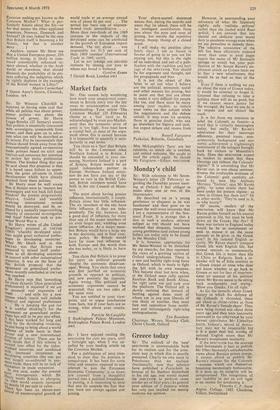Sir: Sir Winston Churchill is reported as having once said
that While all politics was about power, Power politics was about the misuse of power. Sir Harry Legge-Bourke (23 January) asserts that politics is essentially concerned With sovereignty, inseparable from Power, and then goes on to advo- cate what can only be described as its misuse. For he recommends that Britain should break away from the internationally agreed co-operative trade policies based on oArr and UNCTAD and announce her intention to review her entire preferential System. The kindest thing that can be said about this proposal is that it is based upon failure to appre- ciate the great advances in trade development which have already resulted from these policies.
• Sir Harry must be well aware that if Britain were to 'reassert her sovereignty and win back full fiscal freedom' the present progressively effective, fruitful and steadily evolving international system Would be destroyed, and be re- Placed by a mutually impoverishing anarchy of reasserted sovereignties and fiscal freedoms such as pre- ceded World War II.
Sir Harry writes of ,the United _
tkingdom's proposal at UNCTAD (1964) 'whereby developed coun- tries might grant unilateral prefer- ences to developing countries.' What Mr Heath said at this UNcrAo was that Britain was Prepared to extend tariff prefer- ences to all developing countries in concert with other industrialised countries. It was on the basis of Ibis British proposal that the agreement on generalised prefer- ences recently concluded at UNCrAD Was reached.
Sir Harry says that 'something
far more dynamic [than generalised Preferences] is required if we are 1° promote real expansion of trade . ,' and calls for a new sYstem which 'could well include bilateral and regional preferences
• .' He is jumping the gun (or
15 it wishful thinking?) for the agreement on generalised prefer- Pees has still to be put into effect. tt has been worked for long and nard by the developing countries, 1135 aim being to bring about a world f Mance of trade more in their and a new international rvision of labour. There can be 1111e doubt that if this scheme is • arried into effect by the indus- 4a,lised countries and combincd a 1c increased investment in veloping countries (the one per ct target) co-ordinated to pro- rte trade, there will be no lack of 4/791 arnism in trade expansion. fl any case, under the present 4i/ivrir arrangements which Sir art)? wants Britain to abrogate, 1)12 1969 world exports increased 1.4_ nearly 14 per cent in value . . . .nere . has been an eleven-year Period of uninterrupted growth of world trade at an average annual rate of about 81 per cent . . . The period has been one of unprece- dented trade intensification. . . . More than two-thirds of the 1969 increase in the imports of the developed areas can be attributed to the growth of European import demand. The EEC alone . . . was responsible for 51.5 per cent of their 1969 increase' (International Trade in 1969, GATT).
Let us not indulge our atavistic instincts by closing our eyes to where our bread is buttered.
Gordon Evans
7 Gerald Road, London swl


































 Previous page
Previous page